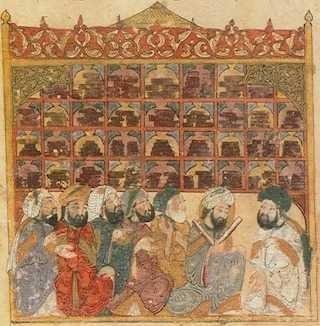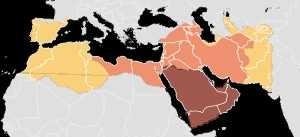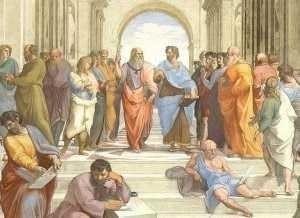The Role of Islamic Civilization in the Development of Science
Hello everyone !, steemit friends all, On this occasion I want to tell you about a piece of history journey that is really exciting but also ironic from civilization that has amazingly contributed to the development of modern science. This civilization is the second torch relay holder of the development of human science, which first started from the classical era of Greece, Rome, Persia, India. For the next the torchstick was diestafetkan to European scientists who began to enter the Renaissance.
Wow, what civilization dong that became the bridge of the transition between the classical era to the era of RenaissancedanEnlightenment? Yak, as you guessed from the title we will be a fun story about the Golden Age of Islamic Civilization when all the most brilliant scientists and scholars of the world at that time gathered in an Arab, Persian, and Spanish Caliphate.

Painting by Yahyá al-Wasiti, Baghdad 1237 on the situation of study under the Abbayah dinar |
source: http: //en.wikipedia.org/wiki/Islamic_Golden_Age
Well for all steemit friends, who already learn pake Curriculum 2013, maybe already familiar with this topic. If I observe, many of the scientists of the golden era of Islamic civilization is often called on almost all the subjects of all handbooks. In fact this topic is also quite often mentioned in various associations, whether in class, in mosque, in certain study groups, or in open discussions. Just unfortunately, if I usually mention those who mention about the golden era of Islamic civilization is just "asbun" doang (origin of sound), aka not really understand deeply what is the product of the Golden Age of Islam. From the beginning of how the background, why the civilization can produce so many scientific developments, whose characters are behind the role, the supporting factors of the era continues, until what caused the golden age of Islamic civilization was eventually destroyed.
Well, in the article Zenius this time, I will try to briefly explore the entire dynamics of the era of Islamic golden civilization. Surely there are many things that I may miss because I can not summarize everything that happened within 500 years with just an article. But hopefully this article can still be a trigger for you to find out more about the enormity of this civilization.
Actually where is the golden era of Islam? Referring to what time in history?

Joint mapping of the reign of the khalifah empire from the expansion of Muhammad, Rashidin, and Umayyad.
before we continue the discussion more in dalem, it's good we have to know first when actually Islamic Golden Age it? Okay so the same meaning of the Golden Age of Islam is a period when the Arab World is politically united under the Caliphate. In this era, especially under the rule of Harun Al Rashid and Al Ma'mun, the Islamic world is progressing science, science and culture extraordinarily rapidly. Traditionally, this period has a range between the 8th century AD to the 13th century AD.
Many historians have an opinion that this period was also marked by the time of the founding of Bayt al Hikmah (750 - 1258) which was the center of study, the library, and the largest university in the world at the time. In this quite long period (about 500 years), there can be no other civilization on earth that can match the rapid development of science in the Islamic world, from Europe, China, India, all salute with the tenacity of the Caliphate that upholds the science beyond any civilization at that time.
The development of science before the civilization of Islam

Painting School of Athens by Raffaello Sanzio
Before going into the main discussion, I want to mention a little of the development of science before the golden Islamic civilization which later will be a source of inspiration from the cultural and philosophical development of Islamic Golden Age. Before the era of Islamic Golden Age, the development of science began separately from Greece, India, and Persia.
The era of classical Greek philosophy began in the 6th century BC, which became the foundation point of philosophy and the development of science. In this era, the initial concept of a state is made, the laws of logic, deduction, induction, syllogism are conceived. It was in this era that the classification of science that we know now is assembled, from the start of biology, mathematics, astronomy, economics, politics, law, etc.
Meanwhile in India and Persia, ancient civilizations there have made counts to 1012 written on the Book of Yajurveda (1200 BC). In 800 BC, a philosopher named Baudhyana, had thought of the basic concepts of Pythagorean theorem. In the world of astronomy, Vedanga Jyotisa (6th-4th century BC) has been discussing the problem of calendar calculations, astronomical measurements, and the determination of the basic rules of celestial observation. Then the numbers we use now nih (0-9) initially dikembangin by Indian mathematicians in the Mauryan dynasty. Meanwhile, the concept of number 0 (zero) itself was also first developed by Aryabhata (approximately 500 AD) which was further developed by Al Khwarizmi (780-850M) and Al Kindi (801-873 AD). So many are now mistaken that this figure is called "Arabic numerals", which should be the "Hindu-Arab numbers".
Well, that was part of the influence of the development of science from Greece, India, and Persia which contributed greatly to the development of science of the caliphate of the golden age of Islam